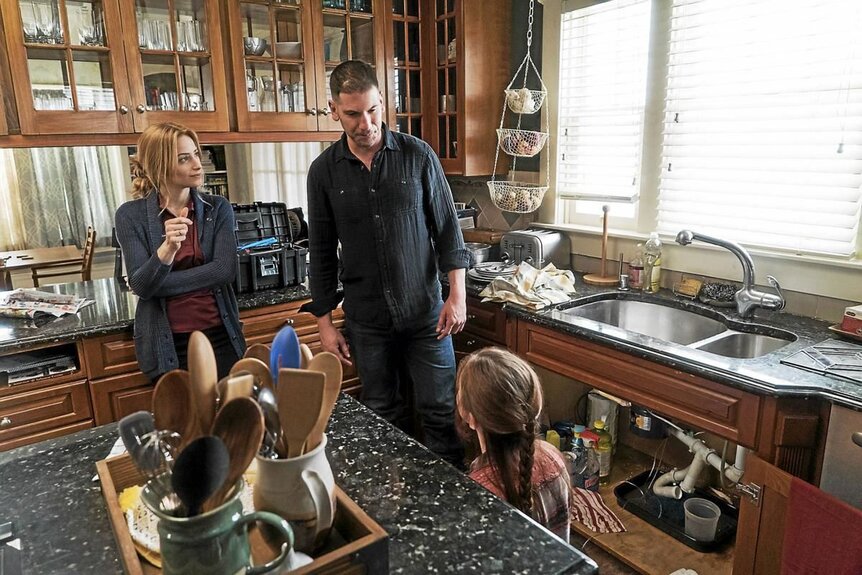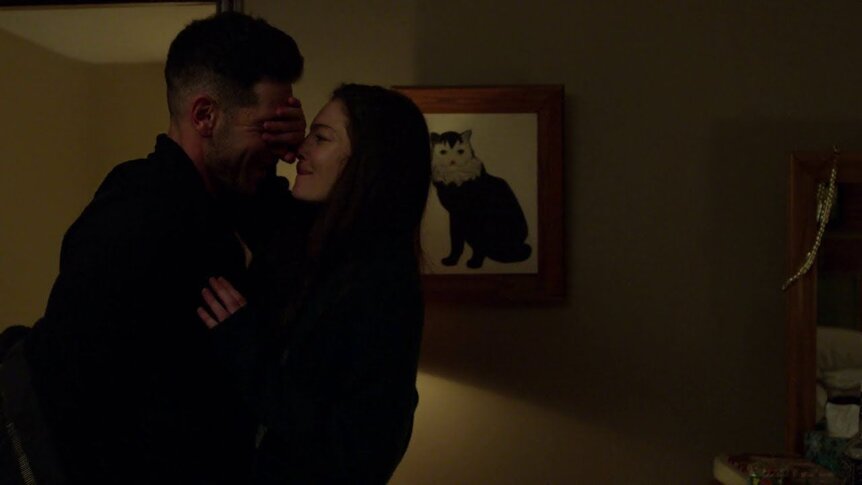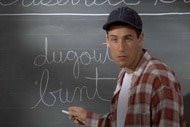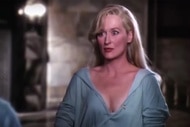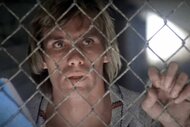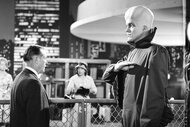Create a free profile to get unlimited access to exclusive videos, sweepstakes, and more!
Frank Castle and The Punisher's secret soft side
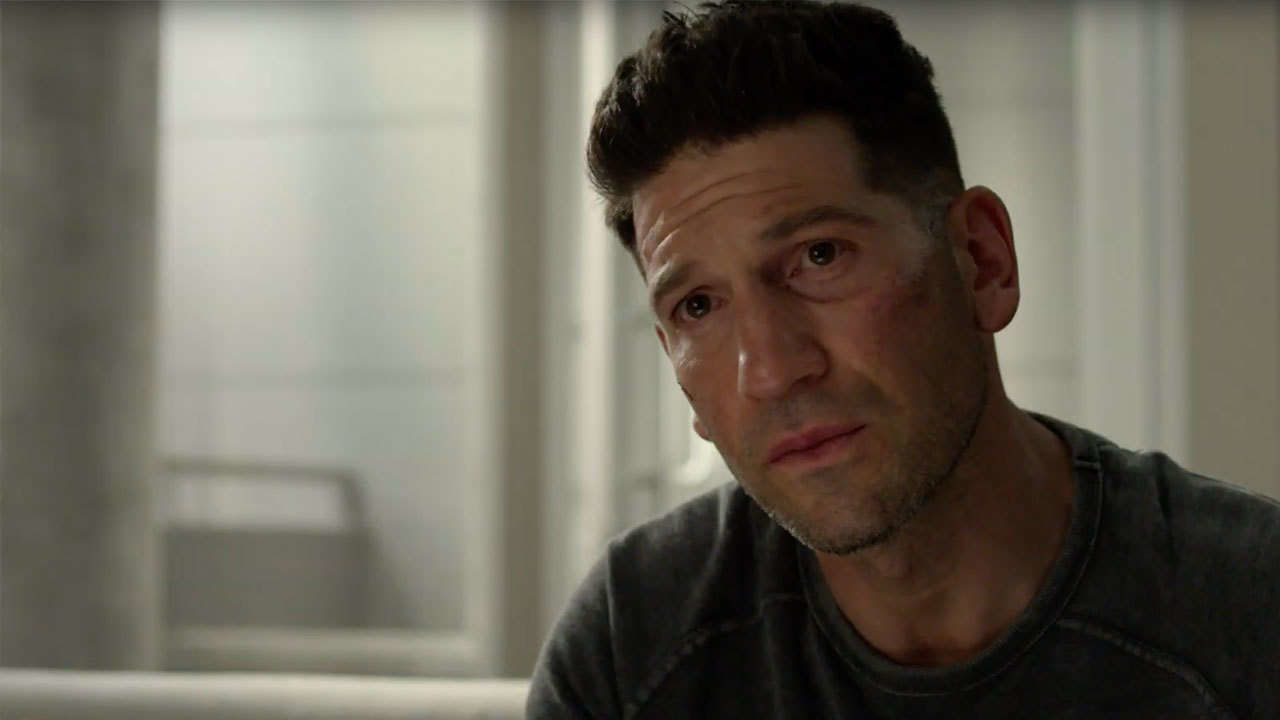
What do you think of when you think of the Punisher?
Likely, your first thought turns to murder, or violence, or his longstanding run in comics as a less-than-subtle costumed vigilante with a ruthless taste for vengeance, or his skull symbol that's experienced some serious misuse outside of pop culture lately. And you wouldn't be wrong if your mind did run along those lines, but we're not here today to talk about that version of the Punisher, a very complex character with an equally complicated history.
No, we're talking about the Punisher, otherwise known as Frank Castle, as played by Jon Bernthal on the short-lived Marvel Netflix series — and why he might actually be a secret bae.
It's hard to grasp at first: how can a character with a long track record of violence, who adopts the mantra of "an eye for an eye" quite literally, even be worthy of bae status in the first place? But the qualities that are inherent in some of romance's most swoonworthy heroes can, in fact, be noted in Bernthal's portrayal, including some very specific examples that point to his bae potential.
Brooding, tortured, mostly silent type who's suffered unimaginable loss after the deaths of his wife and children? Check. Reluctant antihero who defends the weak and is willing to protect his friends and the people he cares about? Check. A man chock full of dad jokes and a surprising amount of domesticity? Triple check. Most of those layers can be attributed to the talents of Bernthal, the latest actor to offer his take on Frank Castle after a string of debatably successful feature films, who turned the character into more of a three-dimensional man and less of a flat archetype. Yes, Frank is the Punisher, but that's also a mantle the public has afforded to him and one he doesn't wear with honor or any significant amount of pride. Yes, he goes on a vengeance kick after his family is brutally murdered, but he doesn't kill indiscriminately; his revenge is solely limited to those who had a hand in his biggest losses. He has a basic moral code — no innocents, especially women or children — and he has a particularly big weakness for dogs. Look to the pages of nearly any romance novel these days and you'll find countless heroes who share similarly defining characteristics.
It's not only Frank's sense of ethics that direct him to spare women and kids, either; he's a family man at heart, and the most tragic part of his character lies in the fact that what he loved the most was ripped away from him — terribly, violently, later revealed to be orchestrated by one of his closest friends. His most frequent recurring nightmare is the day they died, a dream that replays over the course of the series early and often to remind the audience of how much it weighs on his mind.
But even in his grief, he doesn't lash out — except against the people who carry out that type of violence themselves. He's not a misogynist; he respects women, even steps in to defend and protect female characters like Karen Page and Beth Quinn on multiple occasions, against threats ranging from drunk assholes to a veteran suffering from PTSD. And his love for kids can't be understated — in fact, a running throughline in the first season of The Punisher emphasizes just how instinctually deep Frank's dad tendencies run.
When single mom Sarah Lieberman "accidentally" hits Frank with her car, she's unaware that their seemingly chance meeting is actually very purposeful on Frank's part. His repeated offers to help her around the house — first in repairing the damage he inadvertently caused to her car, then fixing a broken garage door, then helping her daughter Leo fix a leaky sink — aren't completely altruistic. In the beginning, they're designed as leverage against Frank's partner Micro, also known as David Lieberman, who faked his own death to protect his wife and children after his exposure of government secrets threatened their safety. Frank's none too pleased about Micro's unearthing of his past via some stealthy hacking, and tries to establish a friendly relationship with the other man's family to wield as a potential bargaining chip of his own. Frank's not counting on getting attached, or even remotely caring about Micro's son and daughter — or on what happens when he and Sarah start to open up to one another about what it feels like to lose a spouse.Of course, Sarah's husband isn't technically dead, and the Lieberman family is happily reunited by the first season's end, but watching the subplot unfold leading up to that point feels like the highlight reel of any domesticity-driven fanfiction. Frank might start out trying to get to know Sarah and the kids for a very specific reason that largely doesn't have anything to do with them, but as he continues to make himself available for their needs — even spontaneously showing up on Sarah's doorstep with flowers in one scene — he develops more of a friendship with the family and, it could be argued, temporarily fills in as a surrogate dad when son Zach starts acting out in the aftermath of his own father's absence. In many ways, Frank's growing attachment to the Liebermans showcases one of his deepest, unconscious longings: to find true happiness again, something he realizes remains unavailable to him while he's on a mission of violence. But it doesn't stop him from trying to pursue it on occasion.
At the beginning of Season 2, Frank is in a very different place than the one he ended up in. He's on the road, living under an alias and far removed from anything having to do with the Punisher — and for the first episode, at least, it seems like he might actually succeed in returning to normalcy. He comes to the aid of the aforementioned Beth at the roadhouse bar where she works, and the conversation that follows is one that takes them through several rounds of drinks (on Frank's end) before they decide to go back to her place for a little between-the-sheets action. On a purely thirst-driven note, the scene that follows is scorchingly hot, but on an emotional level, it's somehow infused with a surprising amount of tenderness between them. Beth's the first person Frank's opened up to in a long time — at one point, he shares his real name with her and tells her about the loss of his family out of a desire to keep things honest between them, and they both express the relief that comes from not feeling so lonely, at least while they're in each other's arms. It's a one-night-stand that doesn't bear any of the trademark qualities of the term; when Frank tries to sneak out early the next morning, he's caught by Beth's young son, and the three eventually have breakfast together at the nearby diner.
Of course, The Punisher is a show that frequently reminds us of the futility in Frank's attempts to find true happiness, and when a young woman named Amy stumbles into the bar the following night with assassins on her heels — the same night Frank's just decided to put down roots and maybe try to make things work with Beth long-term — the fight that ensues puts Beth, the woman Frank's just started to let himself care about, at risk. Beth's caught in the crossfire, and while she does survive in the end, Frank realizes that his role as the Punisher isn't something he can so easily shed, not when he could inadvertently endanger lives by failing to protect them. It's a theme that's revisited later on in the season when he's back in New York, recovering in a hospital under police custody, and gets an unexpected visit from Karen, who reminds him that it's not too late to let himself have what he wants. But the most tragic aspect of Frank's character, even while he secretly epitomizes most of the qualities of a romantic hero, is that he'll never be convinced he deserves romance; he'll risk everything to save others while refusing to let them do the same for him, and that includes walking away from the possibility of a happy ending.The eventual announcement of The Punisher's cancellation after Season 2's conclusion — along with the entire set of Marvel shows on Netflix — ended Frank's evolution on the small screen before it had ever truly had a chance to emerge. With his long, hard-fought battle against his most personal demons finally drawing to a close, the potential for him to grow even more was there, only to be cut short all too soon. Bernthal's portrayal clued us in on the sensitivity and vulnerability that exists beneath the violence and the vengeance, something that isn't always made apparent in other iterations of the character. It's hard not to think about what could have been if the show had been allowed to continue, but one thing's for certain: within the two seasons we got, we were given a humanized, fully developed, quietly profound depiction of Frank Castle.
The views and opinions expressed in this article are the author's, and do not necessarily reflect those of SYFY WIRE, SYFY, or NBC Universal.
